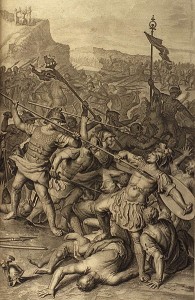Twenty-ninth Sunday in Ordinary Time
Lectionary: 147
EX 17:8-13
PS 121:1-2, 3-4, 5-6, 7-8
2 TM 3:14-4:2
LK 18:1-8
 The reading from the gospel this week follows Jesus’ comments about the coming of the kingdom of God, an event that is far enough off that the disciples will long to see it but will not (17:22). This interim period between the present and the future kingdom is a time of tribulation, and Jesus’ followers will be tempted to lose hope. This week’s gospel is an exhortation to be persistent in the face of that tribulation, and to “pray always without becoming weary.” The reading affirms God’s faithfulness that He will hear His people’s prayers and will not fail to answer them.
The reading from the gospel this week follows Jesus’ comments about the coming of the kingdom of God, an event that is far enough off that the disciples will long to see it but will not (17:22). This interim period between the present and the future kingdom is a time of tribulation, and Jesus’ followers will be tempted to lose hope. This week’s gospel is an exhortation to be persistent in the face of that tribulation, and to “pray always without becoming weary.” The reading affirms God’s faithfulness that He will hear His people’s prayers and will not fail to answer them.
The gospel and our other readings are about hope. During this pretty dismal election season, I have been thinking a lot about hope and its critical role as a political virtue. Charles Mathewes, in his still-relevant text The Republic of Grace: Augustinian Thoughts for Dark Times call the cultivation of hope the central political task of today.”
When we look at political life, we are tempted toward anxiety and despair. We see how our best efforts fall short, and even our attempts at good are perverted. I was recently chatting with a person who had voted for Obama eight years ago, fired up by the optimism of the campaign and the expectation of a different sort of politics, a politics of civility and compassion and collaboration. “I’ve never been so disappointed. It feels like we are worse off than before. Another war, the nation divided against itself. Why do we even try?”
Hope is what animates us when we start to feel like this. Hope is what stops us from wringing our hands and motivates us in the continued pursuit of a just society. In Faithful Citiizenship we read,
In this fight for justice, God gives us a special gift, hop, which Pope Benedict describes in Caritas in Veritate as ‘burst[ing] into our lives as something not due to us, something that transcends every law of justice’ (no. 34). Thus we take up the task of serving the common good with joy and hope, confident that God, who ‘so loved the world that he gave his only Son,’ walks with us and strengthens us on the way (Jn 3:16).
How do we receive the gift of hope in this trying time? The gospel this week tells us to be persistent in prayer. We should always remember God’s ultimate sovereignty, even in political affairs. But our second reading from Second Timothy tells us also that we are to remain faithful to what we have been taught. We are to “be persistent whether it is convenient or inconvenient [and] convince, reprimand, encourage through all patience and teaching.” Faithful Citizenship also makes this connection between being faithful to the moral teachings we have been given and our hope for a more righteous civil society.
God is love, and he desires that we help to build a ‘civilization of love’—one in which all human beings have the freedom and opportunity to experience the love of God and live out that love by making a free gift of themselves to one another. Pope Francis encourages us in Evangelii Gaudium to meditate on the inseperable bond between our acceptance of the message of salvation and genuine fraternal love . . . .God’s word teaches that our brothers and sisters are the prolongation of the incarnation for each of us: ‘As you did it to one of these, the least of my brethren, you did it to me’ (Mt 25:40).
It is commonly acknowledged that “they will know we are Christians by our love” but as Christians we must also be known for our hope, which is inextricably bound up in the way we love. Our hope commits us to political engagement, to our work of promoting the common good and a future in which all will benefit even when the political process seems so profoundly fallen. Our hope directs us toward the future but not by ignoring the present, but rather by actively seeking to transform the present.
And so maybe it is good that this election season does not seem to offer Christians any easy choice for a candidate to support, for it reminds us that our hope is not ultimately in a person or a platform, but rather in a God whose promises are true, a God who will not fail to give His children the justice that they ultimately long for.


